Posts by Christopher Lochhead
113 Netflix’s Founding CEO Marc Randolph
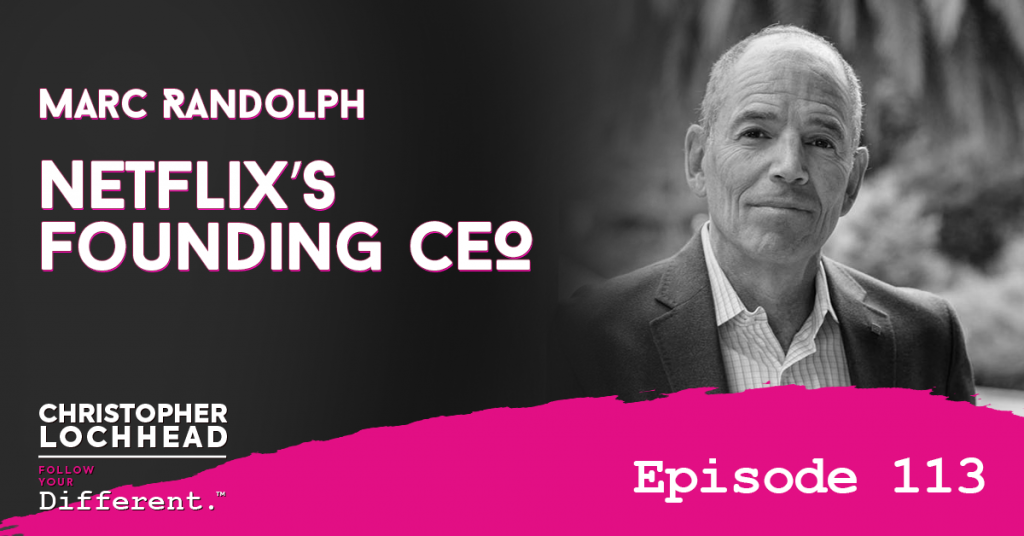
Podcast: Play in new window | Download (Duration: 59:52 — 55.1MB) | Embed
Subscribe: Apple Podcasts | Spotify | Pandora | RSS | More
Category King Marc Randolph, the founding CEO of Netflix, joins us today for a stunning conversation about business and life. He’s got a legendary bestseller out called That Will NEVER Work: The Birth of Netflix and the Amazing Life of an Idea, which he also talks about in this episode.
This is the first in a special two-part series about two of the most legendary category king companies in the world now Netflix and Amazon. Next episode is with John Rossman, author of “Think Like Amazon.”
Book: That Will Never Work
After nearly 16 years after he left Netflix, Marc Randolph talks about his book That Will Never Work. He candidly shares that all those years waiting for the right time to write a book helped him to gain perspective.
First, he says he is wiser business-wise as he worked with a lot of startup companies in the past 16 years. He says he can now identify patterns as they emerge and can safely say he can tell between what works and will not.
“The other cool thing that came out of waiting was, being able to look back and be honest about myself. To really say, ‘I don’t care how it’s perceived. I want this to be a real true portrayal of what it’s like in a startup.’” – Marc Randolph
Remembering Moments, Not Details
Marc also shares that he tried to get it right, but since he is writing about events that took place around 20 years ago, he shares how ridiculous it would be to remember every line and dialogue that he featured in the book.
He also shares he focused on remembering the moments, especially the mood of the conversations that he had. Christopher even remarked a portion of the book where Marc wrote: “This is a memoir, not a documentary. This is kind of how I remember things. I’m not trying to get it 100% right.”
Everything is Intermingled
Christopher chides with Marc on the part where he mentions that personal life intermingles with business life. Marc stressed the importance of devoting time for spouses and kids, as this is a realistic portrayal of a startup.
“I think part of being successful is having balance in your life. I preach about culture is not about what you say, it’s what you do. So I wanted to show how we did it, how do you really have balance in your life.” – Marc Randolph
To hear more about life and business lessons from Netflix Founding CEO Marc Randolph, download and listen to the episode.
Bio:
Marc Randolph is a veteran Silicon Valley entrepreneur, advisor, and investor. As co-founder and founding CEO of Netflix, he laid much of the groundwork for a service that’s grown to 150 million subscribers and fundamentally altered how the world experiences media.
He also served on the Netflix board of directors until retiring from the company in 2003.
Marc’s career as an entrepreneur spans four decades.
He’s founded or co-founded six other successful startups, mentored hundreds of early-stage entrepreneurs, and as an investor has helped seed dozens of successful tech ventures (and just as many unsuccessful ones).
Most recently, he co-founded analytics software company Looker Data Sciences, which was recently purchased by Google for $2.6 billion.
Outside of the tech and startup world, Marc sits on the boards of Chubbies Shorts, Augment Technologies, the environmental advocacy group 1% For The Planet, and the National Outdoor Leadership School (NOLS), which he’s been involved with for most of his life.
A resident of Santa Cruz, California, Marc travels and speaks all over the world, and still probably manages to go surfing more than you do.
Links:
We hope you enjoyed this episode of Follow Your Different™! Christopher loves hearing from his listeners. Feel free to email him, connect on Facebook, Twitter, Instagram and subscribe on iTunes! Get amazing, different stories on business, marketing, and life. Subscribe to our newsletter The Difference.
112 California Wildfires & The Heroes Who Fight Them w/ TJ Welch
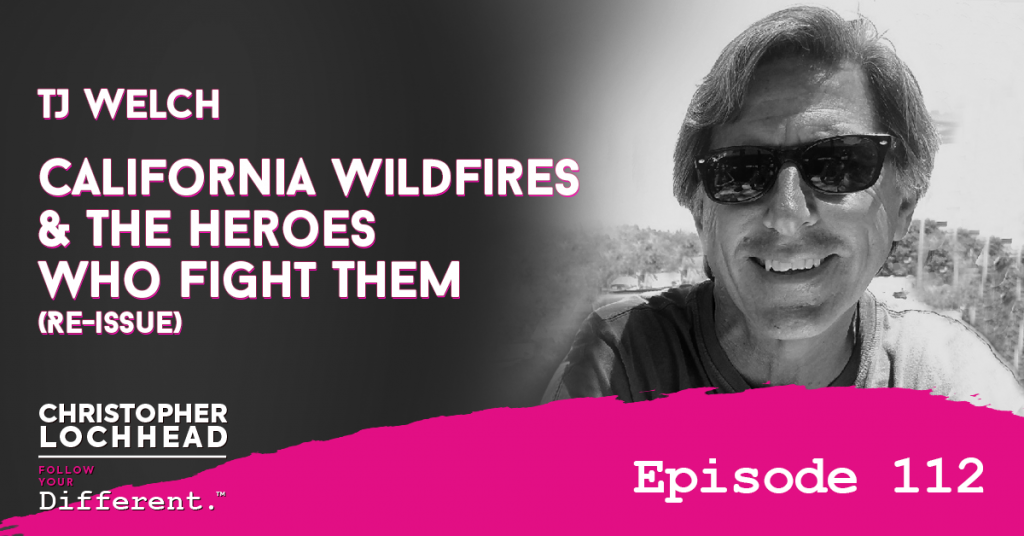
Podcast: Play in new window | Download (Duration: 1:04:17 — 59.2MB) | Embed
Subscribe: Apple Podcasts | Spotify | Pandora | RSS | More
As California is suffering another horrible season of wildfires, we thought it would be powerful to give you some inspiring insight into how heroes fight these massive fires. On this special reissue episode, Retired Battalion Chief TJ Welch gives us an insider’s view of how thousands of Firefighters and first responders spring into action in a matter of hours to save lives and property.
TJ Welch – Starting Out in the City
TJ spent the first years of his career dealing with brush fires and structural fires. He also had his fair share of wildland fires as a chief officer. But he and other city firefighters pretty much only stood guard in front of the houses.
It wasn’t until the late ‘90s when they made full use of city firefighters. They went to timber and brush areas to stop fires and perform other operations.
“This was my moment where it kind of changed my perspective of my role as a chief officer.” – TJ Welch
Wildland Fire in Numbers
Back in the day, the biggest of wildland fires reached up to 160 thousand acres, which is equal to the same number of football fields. This number has been expanding in recent years, reaching up to 200 thousand acres of wildland catching fire.
The terrifying numbers make sense when taken in the context of the number of residences, the timber that is involved, how exposed the wood is, and how quickly it burns. These wildland fires burn a couple of football fields per second. They are impossible to outrun and risk many lives.
There’s a lot of reasons as to why wildland fires catch so quickly. On the other hand, timber could take a while to dry and get moisture back. With the drought that has gone on for so many years along with other forest products left out in the open, the wildland fires have become more gigantic.
A Turning Point
There was one fire that forever changed TJ. This gave way to a collective effort to train firefighters in the art of effective mobilization when tempering these massive fires.
“When I left that fire, I said I’m not gonna be so ignorant when I come to another wildland fire.” – TJ Welch
To hear more about how California firefighters move as a unit and how TJ Welch dealt with the massive responsibility of being a leader, download and listen to the episode.
Bio:
TJ Welch is a 32 year veteran of the fire service.
Throughout the course of his career, he served in volunteer, industrial and municipal fire departments.
TJ was a member of CAL Fire ICT 3 from 1997-2005 and a founding member of CICCS. He was a qualified Type OSC2, OPBD, DIVS, and STEN.
TJ retired in 2014 as Battalion Chief with Alameda County Fire Department.
He currently teaches and writes Officer courses for OSFM, and is a Firefighter Safety Specialist for California Department of Public Health and NIOSH where he investigates firefighter line of duty deaths.
Links:
How to donate to victims of Fires in California:
How To Help Victims Of California Wildfires As Tens Of Thousands Are Forced To Flee Homes
Supplying Aid To Victims Of Emergency (Save)
California Community Foundation: Wildfire Relief Fund
We hope you enjoyed this episode of Follow Your Different™! Christopher loves hearing from his listeners. Feel free to email him, connect on Facebook, Twitter, Instagram and subscribe on iTunes! Get amazing, different stories on business, marketing, and life. Subscribe to our newsletter The Difference.
022 Is Your Marketing Better or Different?
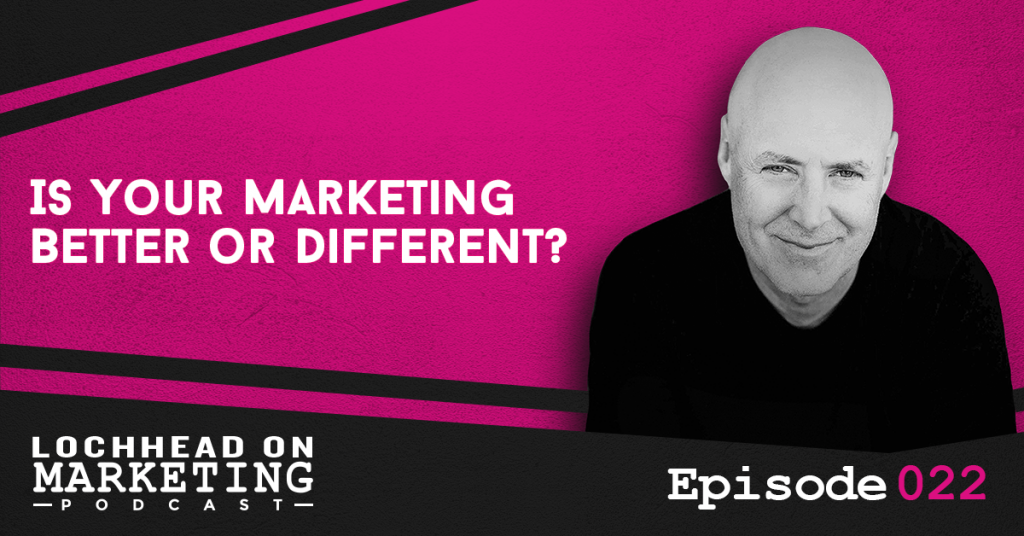
Podcast (lochheadonmarketing): Play in new window | Download (Duration: 7:41 — 7.2MB) | Embed
Subscribe: Apple Podcasts | Spotify | RSS | More
Christopher Lochhead discusses differentiation or differentiators of a brand, product or company. He further shares what legendary marketers do, makes their marketing better or makes it different?Differentiators
We often hear this word a lot in marketing: differentiation. Christopher poses the question when speaking about a product or brand differentiation, is it really different or is it better? In reality, when most CEOs, CMOs, entrepreneurs and product investors say differentiators, what really comes out of their mouth is better. Christopher however, believes making a difference is the better choice.True Differentiation
Christopher suggests a brainstorming session with people in order to determine true differentiation. Create a list of “what makes you different.” Step back and look at your extensive list and tick what makes you different.“If you have a list of 50 differentiators out there, if five of them are truly different, you’ll be doing well, I think.” – Christopher LochheadWhy does this matter? It matters because different forces a choice, and better is a comparison game. Legendary marketers want to own a position where they can’t be easily knocked off. They prefer the perception of being unique, distinct, hard to replace and as someone who solves a problem and creates value.
The “Better” Game
Christopher cites Pepsi as the top contender in this “better” game. They run a series of campaigns comparing themselves to Coke. However, this still proves to be ineffective.“The problem with this better game is, whatever you’re comparing yourself better with, ultimately, is the thing you’re giving power to.” – Christopher LochheadOne of the legendary things that category designers and creators tend to do is to never talk about competitors. Exactly, for this reason, the different conversation, forces a choice. Fundamentally, marketing is about distinguishing oneself.
Bio:
Christopher Lochhead is a Top 25 podcaster and #1 Amazon bestselling co-author of books: Niche Down and Play Bigger. He has been an advisor to over 50 venture-backed startups; a former three-time Silicon Valley public company CMO and an entrepreneur. Furthermore, he has been called “one of the best minds in marketing” by The Marketing Journal, a “Human Exclamation Point” by Fast Company, a “quasar” by NBA legend Bill Walton and “off-putting to some” by The Economist. In addition, he served as a chief marketing officer of software juggernaut Mercury Interactive. Hewlett-Packard acquired the company in 2006, for $4.5 billion. He also co-founded the marketing consulting firm LOCHHEAD; was the founding CMO of Internet consulting firm Scient, and served as head of marketing at the CRM software firm Vantive. We hope you enjoyed this episode of Lochhead on Marketing™! Christopher loves hearing from his listeners. Feel free to email him, connect on Facebook, Twitter, Instagram and subscribe on iTunes! You may also subscribe to his newsletter, The Difference, for some amazing content.111 Mia Khalifa Digital Media Super Star
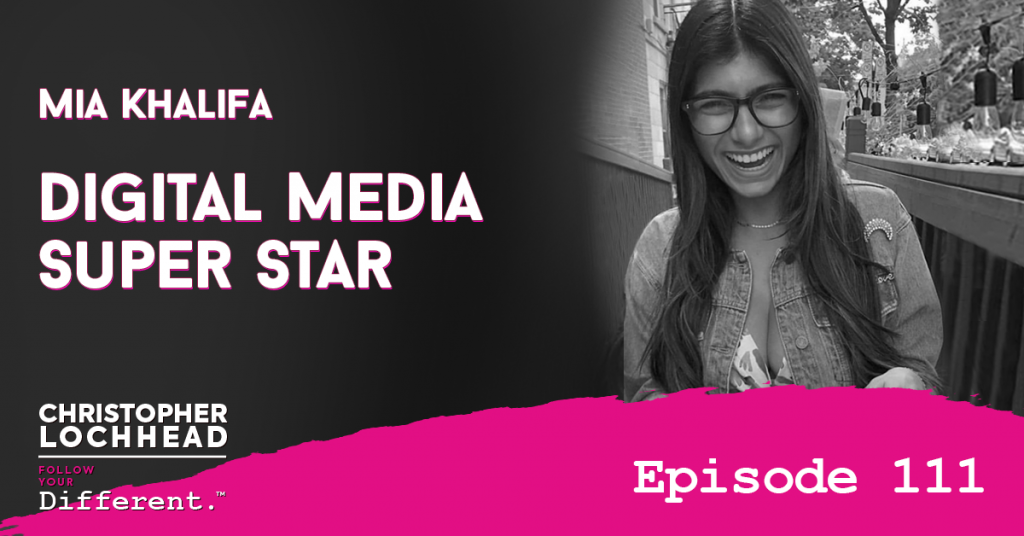
Podcast: Play in new window | Download (Duration: 1:21:13 — 74.7MB) | Embed
Subscribe: Apple Podcasts | Spotify | Pandora | RSS | More
Former adult actor and now digital media star, Mia Khalifa, joins us today for another riveting conversation. She walked away at the peak of her popularity to design a new life and career. She shares with us today about her past and how low self-esteem affected her decisions and how she’s moving forward with her life.
Sports, Punk Rock, and Pets
Mia Khalifa is a sports commentator, with a special love for The Washington Capitals Hockey team. Other than hockey, she used to watch basketball a lot when she was a young immigrant from Lebanon.
“It’s kind of just been a common ground that I could have with people and a way for me to connect, a way for me to feel like I am part of something or feel like I’m a part of this group even if I don’t know anyone. Sports is the unifying factor in this world.” – Mia Khalifa
Other than being a huge sports fan, she is a self-proclaimed foodie and she loves punk rock. She also shares in this episode how she loves her pet dogs so much and how she is trying her best to be the person her dogs think she is: a better human being.
Battling Low Self-Esteem
Mia is also a digital celebrity, raking a total of 17.7 million followers on Instagram alone. In fact, she met her fiance on Instagram. Her fiance is a Swedish Chef, whom she candidly shares, as someone who doesn’t know who she is.
She has never gotten used to fame as she shares how she battled low self-esteem when she was younger. She admits that due to low self-confidence, she made decisions that she regret at the present time.
“I think it was being overweight for such a large part of my life and on top of that, I didn’t really have many friends in highschool. I never fit in in any certain group or the popular crowd or anything. I think it also had a lot to do with never feeling like I belong.” – Mia Khalifa
The Ugly Side of Adult Entertainment
Most of her followers had known her from her previous career as an adult entertainment actor. In fact, she used to be #1 in the biggest Adult sites in the world. She started her adult film career when she was just 21 years old.
What most people do not know is her career only lasted 3 months. She shot about twelve scenes, where produces paid her only $12,000. Adult actors do not receive any kind of royalty, while producers amass millions.
“I was fooled into thinking they had my best interest at heart, when in reality, they were just looking out for themselves. They looked at me and saw a huge paycheck.” – Mia Khalifa on Adult Entertainment Producers
To hear more about #1 Adult Actor to Digital Media Star Mia Khalifa, download and listen to the episode.
Bio:
Mia Khalifa is a social media personality, sports commentator and former adult film actor.
She’s a passionate Washington, D.C. sports fan with a love for the Washington Capitals hockey team.
Links:
Mia Khalifa is among the world’s most-watched women. Yet the porn industry is keeping the profits.
Mia Khalifa: Why I’m speaking out about the porn industry – BBC News
We hope you enjoyed this episode of Follow Your Different™! Christopher loves hearing from his listeners. Feel free to email him, connect on Facebook, Twitter, Instagram and subscribe on iTunes! Get amazing, different stories on business, marketing, and life. Subscribe to our newsletter The Difference.
110 Startup Marketing: Viviana Faga Emergence Capital
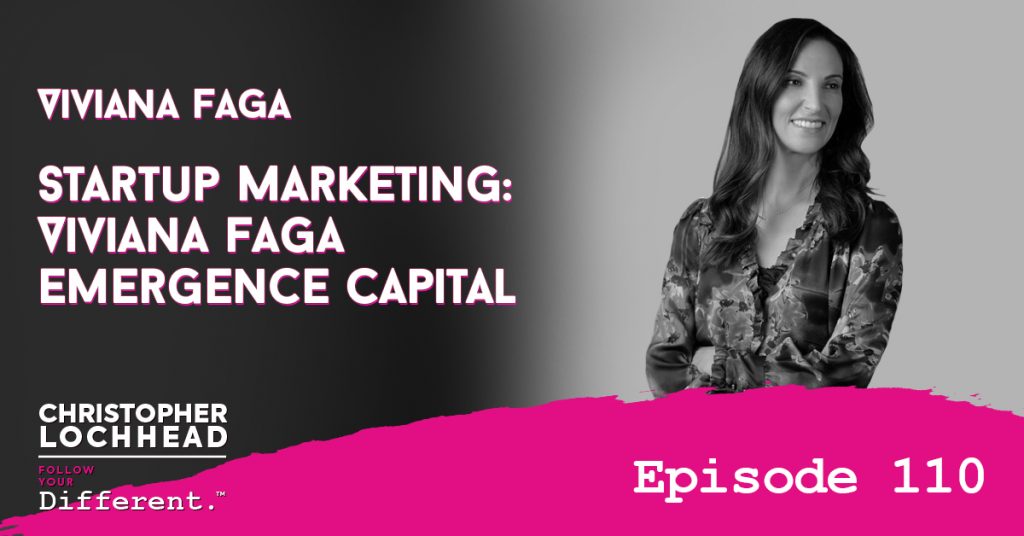
Podcast: Play in new window | Download (Duration: 1:03:10 — 58.1MB) | Embed
Subscribe: Apple Podcasts | Spotify | Pandora | RSS | More
We have another riveting and insightful episode today with Viviana Faga, Operating Partner at Emergence Capital. She is in-charge of marketing and helped create over 150B in new market cap. Today she shares some of her amazing experiences working both with startups and VCs.
The Importance of Marketing
Viviana Faga worked in Senior Marketing roles with companies like Salesforce.com and Zoom Communications. She was the Head of Marketing at Yammer and pioneered the enterprise social space.
At the moment, she coaches CEOs and Founders and leads them in finding the importance of marketing in scaling their businesses.
“You just got $5-15M and you’re thinking, ‘where do I want to spend my money? I want to spend money on building my product and I don’t know who to hire? Why should I hire a marketer? It just seems like one big massive waste.’ That’s what I deal with and those are the kind of questions that I get everyday.” – Viviana Faga
The Best Doesn’t Always Win
Viv narrates her current client who has a great product, but is currently in a category that his competition built. Viv find it fascinating to explain that the best products doesn’t always win. If a CEO doesn’t believe in this, the CEO then finds himself in a never ending cycle of “catch-up.”
“There are plenty of cases where it does. The company just sort of takes off, without great marketing. We’ve seen that. But for the most part, in the competitive market, if you don’t define the category, if you don’t create it, you’re going to really struggle because now you’re gonna look like you’re playing catch up.” – Viviana Faga
Viv advises her clients that the company will never be able to catch up if they continue copying the competition’s message.
“You have to change the game. Come up with completely new messaging. You have to go so hard at writing that message — from your press releases, website and sales collateral. Every single piece of content that is external facing has to speak this new language.” – Viviana Faga
CEOs Who Listen
Viviana was proud to say that she embedded herself into her client’s company. Other than this, she believes that she can only help those who are willing to listen. She narrated how she turned down the CEO of Yammer, twice.
“It was hard to turn him down, but obviously he convinced me. I wanted to work for a CEO who understood the value of marketing and after that conversation, I wasn’t so sure but a lot of folks from Salesforce have gone there. It’s our job to convince him Sales & Marketing matter.” – Viviana Faga
To hear more about Startup Marketing: Viviana Faga Emergence Capital and more relevant information about Viviana Faga, download and listen to the episode.
Bio:
Viviana brings over fifteen years of experience designing and building brand categories for successful cloud/SaaS and enterprise social companies, helping them create scalable growth engines that drive successful exits.
Her particular passions are scaling and structuring go-to-market SaaS teams, messaging and positioning, category creation, freemium product strategy, and sales enablement.
Before joining Emergence, Viviana served as VP of marketing for Yammer, where she defined the enterprise social category. After Yammer’s $1.2B acquisition by Microsoft, she became its head of marketing for enterprise social, which included Office 365, Skype, and Lync. She also spent over six years at Salesforce, where she launched several key product initiatives. Additionally, she was the VP of marketing for Platfora (now Workday) and the CMO of Zenefits.
Links:
Emergence Capital – Viviana Faga
103 The Power of an IPO with Eric Yuen
011 The Perception of your product is your product
We hope you enjoyed this episode of Follow Your Different™! Christopher loves hearing from his listeners. Feel free to email him, connect on Facebook, Twitter, Instagram and subscribe on iTunes! Get amazing, different stories on business, marketing, and life. Subscribe to our newsletter The Difference.
021 Is Your Brand Blue?
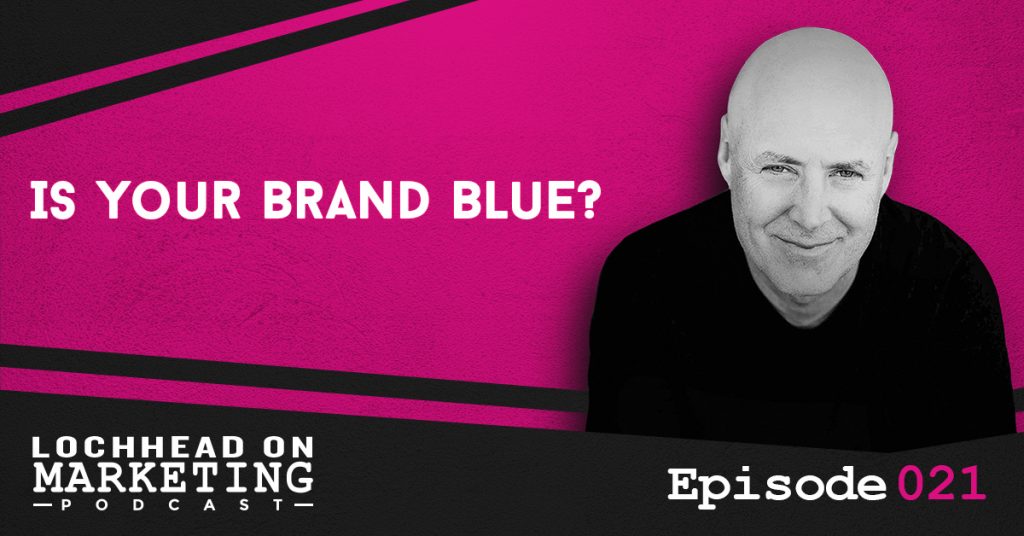
Podcast (lochheadonmarketing): Play in new window | Download (Duration: 11:05 — 10.2MB) | Embed
Subscribe: Apple Podcasts | Spotify | RSS | More
In today’s episode, Christopher Lochhead dives down deep into the power of colors and how it affects your brand marketing. In a world where almost all brands are Blue (and some are red), how do you make your brand different and stand out?
What’s With Color Blue?
Christopher recently represented a tech company with a stand-out logo, it’s color pink and orange. According to this company, 70% of B2B company logos are blue.
Christopher researched this claim and indeed found out, 33% of the world’s top brands companies are blue. Some 29% are red, 28% are black or grey and 13% are yellow or gold.
“A big part of doing legendary marketing is standing out, being different, being unique. Then for the most part, if you’re gonna be blue, you’re not going to stand out and frankly if you’re gonna be red, you’re probably not gonna stand out, too.” – Christopher Lochhead
Colors and Lack Thereof
One of the guests of Follow Your Different David Rendall, Ph.D., author of Freak Factor, is one unique example. He embraced the color pink. In fact, he wears pink shirts, pink suits and even his eyeglass frames are pink.
As a public speaker, he wears pink not only to stand out but to send a message to the world that its okay to express oneself and let go of what others might think of you. Another example is Max Temkin, the creator of Cards Against Humanity. He shared that he has no eye for color so he just went with black and white, with a distinct font.
“If you think about brands how many brands do you know that actually are strategic in their use of color?” – Christopher Lochhead
An Underexploited Opportunity
Legendary companies and legendary brands stand out because they are different. Color is an underexploited opportunity to stand out. Christopher encourages marketers and designers to think strategically about color.
“If you are involved with the re-brand or brand launch, I would encourage you to take a look at all of the brands in your near-space categories and hold it against the wall and look at what they look like [against your brand]” – Christopher Lochhead.
Christopher further asks, “how can you use color as part of your brand, as part of your logo to stand out? Ultimately, he asks what color or colors can you own? This is a great opportunity to gain a strategic advantage over the competition.
Bio:
Christopher Lochhead is a Top 25 podcaster and #1 Amazon bestselling co-author of books: Niche Down and Play Bigger.
He has been an advisor to over 50 venture-backed startups; a former three-time Silicon Valley public company CMO and an entrepreneur.
Furthermore, he has been called “one of the best minds in marketing” by The Marketing Journal, a “Human Exclamation Point” by Fast Company, a “quasar” by NBA legend Bill Walton and “off-putting to some” by The Economist.
In addition, he served as a chief marketing officer of software juggernaut Mercury Interactive. Hewlett-Packard acquired the company in 2006, for $4.5 billion.
He also co-founded the marketing consulting firm LOCHHEAD; was the founding CMO of Internet consulting firm Scient, and served as head of marketing at the CRM software firm Vantive.
Links:
Follow Your Different – Max Temkin
Follow Your Different – David Rendall
We hope you enjoyed this episode of Lochhead on Marketing™! Christopher loves hearing from his listeners. Feel free to email him, connect on Facebook, Twitter, Instagram and subscribe on iTunes! You may also subscribe to his newsletter, The Difference, for some amazing content.
109 Build A Tribe of Millionaires w/ David Osborn & Pat Hiban
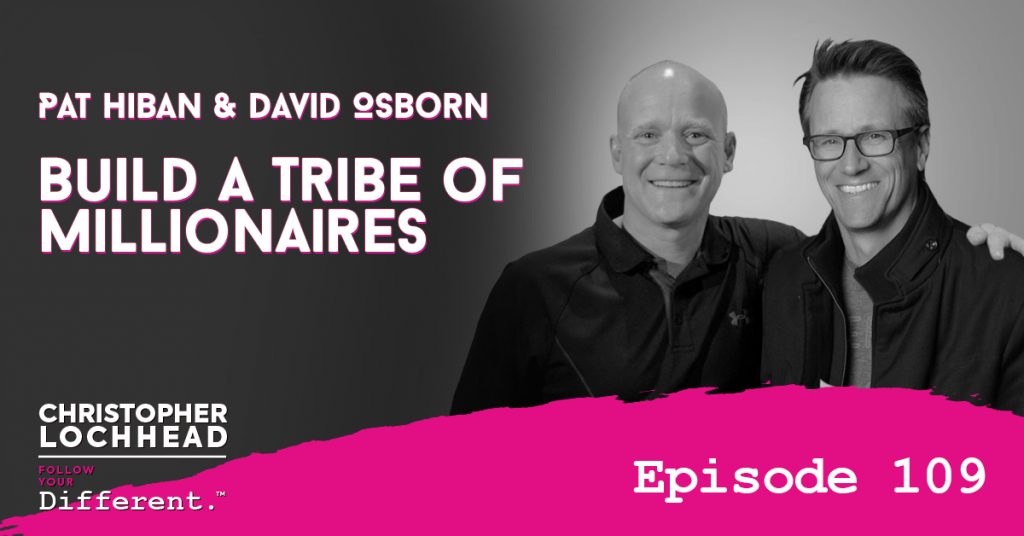
Podcast: Play in new window | Download (Duration: 1:04:14 — 59.1MB) | Embed
Subscribe: Apple Podcasts | Spotify | Pandora | RSS | More
Best selling authors of Tribe of Millionaires, David Osborn and Pat Hiban, joins us to share the story behind their new book. We also have a no BS conversation on making money and why its an important fuel to your life.
Beyond money, we also talk about the power of building a tribe of like-minded people — who will support you in your dreams, goals and a lot more.
Tribe of Millionaires
Entrepreneurs, real estate investors, and authors David Osborn and Pat Hiban talk about their new book and the story behind it. Pat candidly shares that Dan Clements helped them put together this book.
“Dan Clements flew to Japan with 27 billbros, members of our mastermind. He listened to each of these members talk. During that time, we masterminded on how to make money and he heard personal stories that we shared.” – Pat Hiban
Dan created Ethan Martinez, the protagonist in the book, from listening to the stories of GoBundance members. GoBundance is a mastermind group for businessmen, who are millionaires. These men get together and share ideas to improve their net worth, health and/or their marriages.
Ethan Martinez
The book Tribe of Millionaires is a fable about Ethan Martinez. He receives a mysterious invitation after the death of his father. He then embarks on an adventure not only to save his struggling business but to discover his past.
“Basically, what happens was, his father dies and he goes to his Dad’s funeral to settle the estate. He hasn’t talked to his father in over 20 years. When he gets there, his father’s pallbearers are all millionaires and multi-billionaires.” – Pat Hiban
Ethan needed to spend a week with these pallbearers on an island before he could inherit the Estate. He then discovers what makes these men successful. Ultimately, he figures out how he can apply these learnings to his life.
Money Fuels Life
David shares how people are more receptive to stories, rather than hard facts. He also adds the importance of spending time with like-minded people who share the same dreams and aspirations.
“You can choose it yourself and put yourself around a lot of people who are on the same journey. That will remind you on a perpetual basis of the greatness you’re choosing. It’s way easier to be great when everyone around you is great.” – David Osborn
Furthermore, he laments how the whole system does not teach kids and adults about making and keeping money. He stresses that money is not everything. However, it allows an individual to create a life that he or she desires.
“Some people think you are a jerk because you talk about money. If you’re doing it with your financial planner, they’ve got an agenda. Me and Pat just have that ability to talk about that wide range of topics including money and being genuinely interested in each other’s well-being. That’s what we’ve created in the tribe too.” – David Osborn
To hear more about how to Build A Tribe of Millionaires and more relevant information about David Osborn and Pat Hiban, download and listen to the episode.
Bio:
David Osbourne
After sticking out his thumb and traveling the world, David returned home to Austin, Texas broke and unemployed, at the age of 26. Though his travels may not have yielded wealth, they instilled the key motivation that he brings to every part of his life to create it — freedom.
Because to have everything you ever wanted takes the opportunity to design your life and believe it can happen.
Through this intention, David began to test his entrepreneurial merits alongside his business-partner mom in the world of real estate. The results were nothing short of remarkable. In less than 10 years, David built one of the top real estate brokerages in the world and he founded over 50 companies.
Yet, more than anything else, the inherent freedom derived from his success awards him the time to focus on the importance on what matters most: being a proud father of two beloved daughters, a son, and husband to the wonderful and talented Traci Osborn.
Today, David continues to travel the world not only to be enlightened by new experiences but to share his insight and expertise with others so they, too, can truly be free.
Pat Hiban
Pat Hiban Interviews Real Estate Rockstars is a top-ranked, 3-day a week real estate podcast. He interviews the best of the best in and around the real estate industry.
He is also the founder of REBUS UNIVERSITY which trains real estate agents to be successful and men’s mastermind group GoBunbance.
After building a team of over 50 members and making millions in the Real Estate Sales World, Pat realized he had spent over two decades being lead by mentors while growing very few mentees.
It was at this point that he wrote his New York Times Best Selling Book -“6 steps to 7 figures, A Real Estate Professional’s Guide Building Wealth and Creating your Destiny.”
Not too long after, Pat Hiban Interviews Real Estate Rockstars was born.
Pat has not always been a semi-retired, New York Times International Best Selling Author, podcast host, entrepreneur, and billion-dollar real estate agent.
After throwing his graduation cap at Frostburg State University in the summer of 1987 (A long time ago), Pat set out to find that necessary three-letter word…..JOB.
While trying to get his Real Estate license Pat substitute taught in Maryland, where he has lived his entire life.
His first year in Real Estate was…. decent. Selling 10 homes, and taking home $13,700 in commissions Pat knew that he needed more.
At the beginning of his third year in the industry, attending a Floyd Wickman Sweathog Course changed his life, and allowed him to realize that being a listing agent was the way to go. He made a commitment and switched to prospecting regularly for listings by calling up and down every street in town looking for future sellers. BOOM business for him tripled. From there, the sky was the limit.
After spending a few years at Long and Foster Realty, he made a switch to RE/MAX where he spent the next 15 years.
In 2004, he became the #1 RE/MAX agent in the world.
Links:
We hope you enjoyed this episode of Follow Your Different™! Christopher loves hearing from his listeners. Feel free to email him, connect on Facebook, Twitter, Instagram and subscribe on iTunes! Get amazing, different stories on business, marketing, and life. Subscribe to our newsletter The Difference.
108 Top 1% of Enterprise Technology Investors Bruce Cleveland
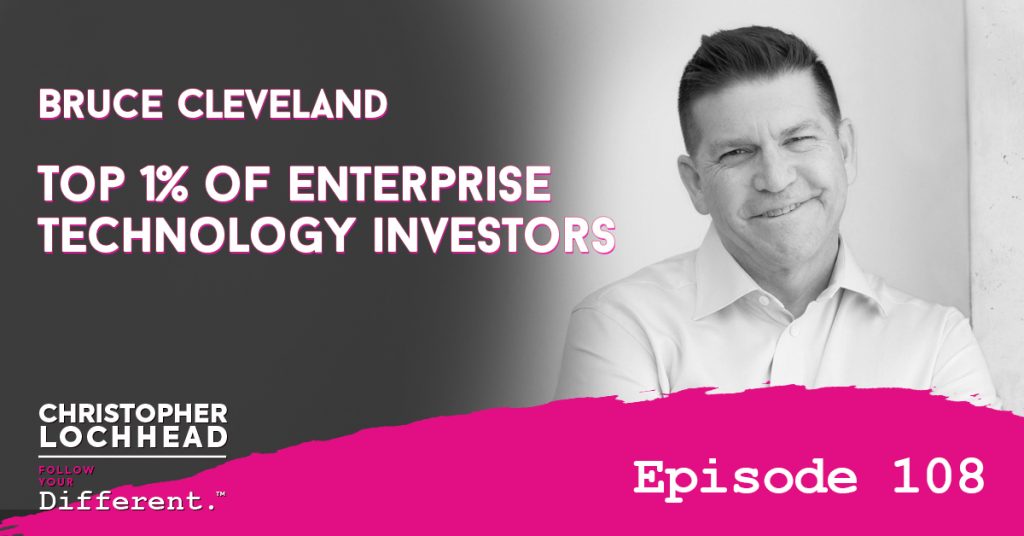
Podcast: Play in new window | Download (Duration: 1:00:16 — 55.5MB) | Embed
Subscribe: Apple Podcasts | Spotify | Pandora | RSS | More
As we continue our run on legendary VCs, we feature today Bruce Cleveland, an entrepreneur, executive, venture capital investor and best selling author of Traversing the Traction Gap. We have a fun and insightful conversation today about the state of enterprise tech and why its the best place to create enduring value. We also touch important points on digital transformation and a lot more!
Legendary VCs
Joining our list of legendary VCs that we have featured on Follow Your Different is Bruce Cleveland. He joins Randy Komisar (Episode 106) and Heidi Roizen (upcoming episode). He is the founding partner of Wildcat Ventures which has been rated in the top 1% of enterprise technology investors on the planet.
At the moment, he is taking up his Masters Degree at John Hopkins University, America’s first research university. He took up Digital Communication, which he feels would be beneficial for writing content for his succeeding books.
Enterprise Tech Scene
Bruce shares a number of important insights into the enterprise tech scene. Furthermore, he shares that the valuations of companies of public SAS companies or tech companies selling into enterprise using a subscription model are reflective of the enduring value.
Additionally, he cites examples of consumer companies that require a tremendous amount of capital, as opposed to enterprise companies, which require much less.
“Consumers require so much capital, not a fund to build a product but to build the market share.” – Bruce Cleveland
Enterprise vs. Consumer Company
Bruce shares what investors are looking for enterprise and consumer companies. The MOIC or The Multiple On Investment Capital is nominally better in an enterprise. However, he mentions that the issue is these enterprise companies take longer to build up.
“You don’t get those big mark up in the first 2 years, as the company began to scale and show minimum viable traction. The important part here is a lot of limited partners, people who invest in venture firms. They want to see early mark up in your funds.” – Bruce Cleveland
These investors want to see great markups to show the committee that the firm is of great financial health. However, they don’t inform the committee how much money they need to get the company “out of the door.”
“They are extraordinarily capital intensive, and the multiple uninvested capitals are high. A lot of these things are faddish. They may work initially, I don’t know, they can move in other areas. Then they’ll be okay, but a lot of times, these things can come and go.” – Bruce Cleveland
To hear more about the Top 1% of Enterprise Technology Investor Bruce Cleveland, download and listen to the episode.
Bio:
Bruce Cleveland is a Founding Partner at Wildcat. He focuses on investments in AI marketing, EdTech, enterprise software as a service (SaaS) and the Internet of Things (IoT).
He’s also the author of Traversing the Traction Gap.
His specific areas of interest include enterprise automation, education and training, and general business applications. Bruce likes working with early-stage companies that use technology and data to increase revenue and decrease costs.
An avid adventurer and sailor, Bruce enjoy the challenge of creating new companies and navigating new markets.
He is interested in growing entrepreneurial hubs outside of Silicon Valley, with a particular focus on the Pacific Northwest.
Bruce also is committed to sharing his knowledge and experience through the Traction Gap Framework™. This aims to help entrepreneurs navigate the critical go-to-market period between initial product release (IPR) and reaching minimal viable traction (MVT).
As a son of school teachers, Bruce supports continued education.
He founded GreenFig to offer applied business science training to higher-ed students and individuals in job transition.
Bruce held senior executive roles in engineering, product management and product marketing. He worked with companies, such as Apple, AT&T, Oracle, and Siebel Systems.
In this role, Forbes and IDC credited him with creating the most effective B2B alliance program in the software industry.
Bruce began his venture capital career at InterWest Partners, where he was the first investor and a former board member of Marketo. The company held an IPO in 2013 and was acquired by Vista Equity Partners in 2016 for $1.8 billion.
Bruce attended the United States Military Academy, West Point, and received a B.S. in business administration from CSU, Sacramento.
Links:
We hope you enjoyed this episode of Follow Your Different™! Christopher loves hearing from his listeners. Feel free to email him, connect on Facebook, Twitter, Instagram and subscribe on iTunes! Get amazing, different stories on business, marketing, and life. Subscribe to our newsletter The Difference.
020 The Power of Podcast Guesting w/Tom Schwab, CEO of Interview Valet
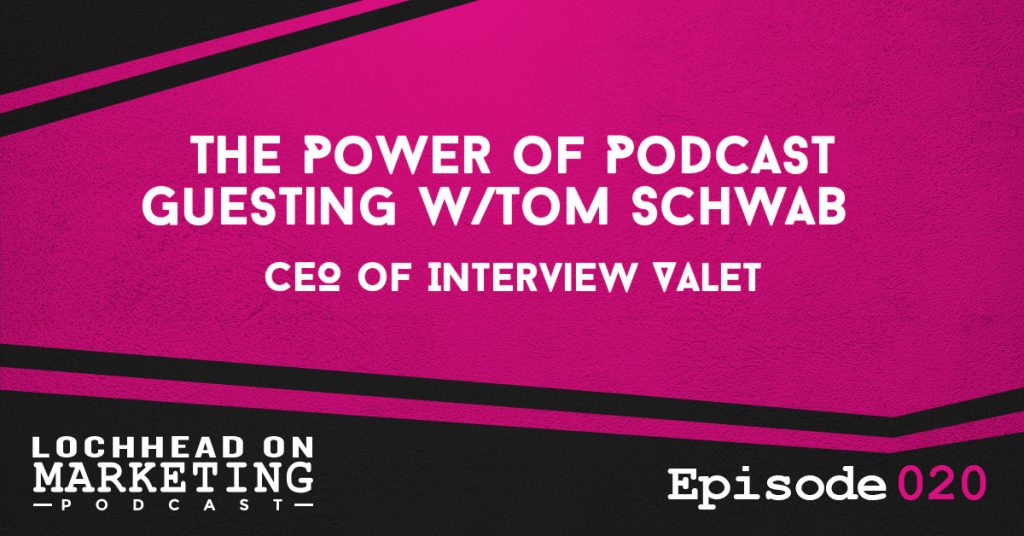
Podcast (lochheadonmarketing): Play in new window | Download (Duration: 46:36 — 42.8MB) | Embed
Subscribe: Apple Podcasts | Spotify | RSS | More
From time to time, we will bring on guests to go deep on a topic in a particular field. Today’s guest is Tom Schwab, founder of Interview Valet. As we celebrate International Podcast Day, we will discuss the power of podcast guesting and why it is a strategic component of legendary marketing today.
Connecting with People
Tom stresses the importance of podcast guesting, especially for business executives, authors, and entrepreneurs. He believes exposure brings opportunity and podcast guesting is one of the most intimate and targeted ways for customers to know somebody.
“I love podcasts because its a way to really connect with people. You’re not yelling, you’re talking with them. They’re choosing to listen to you.” – Tom Schwab
Mainstream Media vs. Podcasting
Tom discusses how powerful podcasting. He says it should be a major part of one’s content strategy. In mainstream media, aside from the cost to advertise (television, print, and radio), one acquires a limited time and limited space, unlike in podcast guesting, where it reaches hundreds of thousands, overtime.
“You’re tapping into an audience, getting that like and trust, getting introduced by someone, they already know. The other thing too is, if you do a live speech, it’s really hard to repurpose that content. If you do a podcast interview, you can do the transcript to make blogs.” – Tom Schwab
Christopher agrees with Tom, as he speaks based on experience. He mentions how he appears on different mainstream media and only get to share a portion of his thoughts for a few seconds.
“Podcast interview is an easy and scalable way to really go deeper. People will understand you and what really drove you, why you got into the business. People should know they could like and trust you. That’s really hard to do in a 30 sec clip or a little Facebook ad.” – Tom Schwab
The Golden Age of Podcasting
Tom cites Harvard University and the conference that they organized last year on podcasting. They call this time as the Golden Age of Podcasting and there is never the best time to explore podcast advertising other than at the present time.
Christopher also shares that there is a lot of whitespace opportunity in podcasting. He believes that there is a high value for sponsors because podcasts provide a high level of intimacy in terms of getting to know the guests through a conversation.
“I think today, brands want to know the heart behind it. Those people that can get out there early and explain that, not in an ad but in an actual conversation. To me, that’s where you can really build up a lifetime value of a customer.” – Tom Schwab
To hear more about the power of podcast guesting and more relevant information from Tom Schwab, download and listen to the episode.
Bio:
Tom Schwab knows how to build an online business.
He’s done it successfully several times and now helps others find online success with podcast interview marketing.
Marketing at its heart is starting a conversation with someone who could be an ideal customer.
Tom helps thought leaders (coaches, authors, speakers, consultants, emerging brands) get featured on leading podcasts their ideal prospects are already listening to. The Interview Valet system then helps them to turn listeners into customers.
The author of Podcast Guest Profits: Grow Your Business with a Targeted Interview Strategy, Tom is also Founder/CEO of Interview Valet, the category king of Podcast Interview Marketing.
Links:
We hope you enjoyed this episode of Lochhead on Marketing™! Christopher loves hearing from his listeners. Feel free to email him, connect on Facebook, Twitter, Instagram and subscribe on iTunes! You may also subscribe to his newsletter, The Difference, for some amazing content.

